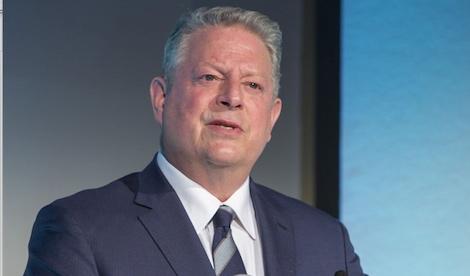
By Adam Woodhall — Al Gore started out giving speeches about the environment in 1989, first with flip charts, then slides, then a mix of digital imagery, animation and high-tech stagecraft and then famously, through the Oscar-winning film released in 2006, which was a significant influence on the author of this article. At the 2017 Ashden Awards ceremony attendees were treated to a keynote, which created vivid pictures in our minds eye without the need for a single chart or slide.
As the Awards are about celebrating success of the most exciting sustainable energy pioneers in the UK and developing world, he opened by first hailing the success of Ashden itself and then celebrating the winners by enthusing: “I have to say I’m extremely inspired by the work that has been done and is ongoing”.
Remarkable record
Gore succinctly summarised the winners: “Tonight’s recipients are providing access to energy. They’re providing jobs. They’re providing light for girls and boys to study at night. They’re reducing the carbon footprint of cities through more efficient infrastructure, including buildings, innovative transportation successes, energy distribution and data analysis. This select group of now more than 200 people and organisations are collectively impacting the lives of more than 80 million people around the world with the support of this organisation. That is a remarkable record.”
Whilst these congratulatory comments were the direct reason why the ex-Vice President was here, the rest of speech was a powerful rallying call. He posed three questions: “The first, for some still, is do we really have to change? Must we change? The second question is can we change? And the third question, perhaps the most important, is will we change?”
We must change
In answer to the first question, he stated; “we must change not only because the global scientific community has been virtually unanimous in telling us that the science is crystal clear, but also because there is a new advocate, more persuasive than all the scientists put together. Mother nature is telling us we must change”. To back this up he cited changes in seasonal patterns and that; “the entire water cycle of the earth is being disrupted because we put 110 million tonnes of manmade global warming pollution into the atmosphere every day”.
Considering the second question, ‘can we change’, Gore was in the absolute affirmative: “There is now in our world a sustainability revolution and it’s best understood in my view by placing it in the context of other great global transformations – the agricultural revolution and the industrial revolution, the digital revolution. This sustainability revolution has the breadth and magnitude of the industrial revolution, but it has the speed of the digital revolution. And instead of beginning in a corner of the United Kingdom in a world of 1.5 billion people and then slowly spreading to western Europe and North America, the sustainability revolution is being jump started in rich and poor countries alike, in every corner of this world of 7.4 billion people.”
We will win
Gore didn’t ignore the hot potato of President Trump’s decision to pull out of the Paris Agreement. He confidently believes that it “is actually stronger today”, and bullishly predicted “We are going to win no matter what President Donald Trump tries to do.”
Like a gathering storm, building with elemental energy, Gore then turned to the final question; will we change? “Just as the sustainability revolution should be understood in the context of the technological revolutions that came before it, the climate movement should be seen in the context of the great moral causes that have transformed and improved the outlook for humanity. In every one of the great moral movements there has been discouragement. There has been despair. There have been advocates who ask ‘How long will this take? Is it ever going to succeed?’”
Impossible until it’s done
He gave examples of movements to abolish slavery, bring suffrage to women, offer civil rights in the US, ban apartheid in South Africa and bring rights to gay people and observed, “what all of these transformative movements have had in common is that they met with the same kind of ferocious resistance that led to despair on the part of many advocates. The late Nelson Mandela once said – ‘It’s always impossible until it’s done.’”
Just as it was wrong to allow slavery to continue, deny women the vote or discriminate on the basis of skin colour or who you love, Gore forcefully drove home the point that “it is wrong to use the sky as an open sewer. It is wrong to condemn future generations to a life time haunted by continual declines in their standard of living and give them a world with political disruption and all the chaos that the scientists have warned us about.”
Gore finished his speech stating: “It is right to give them hope. It is right to give them a clean future and a sustainable and prosperous future, and for those who say ‘We may not have the will to change’, always remember that the will to change is itself a renewable resource.”
If you want more of Gore, you can read the full transcription of the keynote, watch the speech or catch his new movie, An Inconvenient Sequel: Truth to Power.
TriplePundit has published articles from over 1000 contributors. If you'd like to be a guest author, please get in touch!














